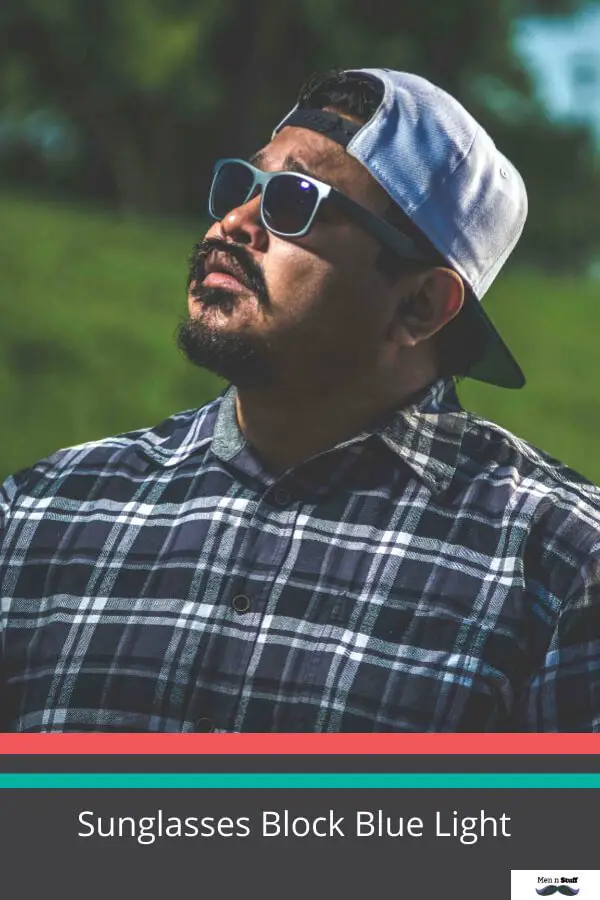Sunglasses may partially block blue light, but specialized blue light-blocking glasses are more effective. Sources of blue light include sunlight, digital screens, and LED lighting, which can impact sleep and eye health.

Sources Of Blue Light
Blue light is visible light with a short wavelength and high-energy. Though a healthy amount of blue light is essential for regulating the sleep cycle, prolonged exposure to blue light can adversely affect and have long-term effects. Some known sources of blue light are:
1. Sunlight
2. Smartphones
3. Tablets
4. Computer screen
5. Led lights
6. Fluorescent light
Blue lights are harmful to you and your kid’s eyes because they cause long-term side effects.
What Are The Effects Of Blue Light On Our Eyes?
Blue light is the color of the light spectrum that we always see. It suppresses melatonin and causes a shift in circadian rhythms. Additionally, it causes oxidative stress in the retina which increases a person’s macular degeneration. As we know looking at a computer screen or smartphone for hours is harmful to our vision. Spending too much time in front of your computer or mobile can cause:
1. Eyestrain
2. Dry eyes
3. Headaches
4. Neck pain
5. Shoulder pain
Though these symptoms are temporary, too much exposure to blue light can cause long-term sleep-cycle disruption. So, if you want to reduce digital eye strain and maintain a healthy melatonin level, you should wear protective eyeglasses and minimize your screen time.
Do Sunglasses Protect From Blue Light?
As we said, sunglasses can block blue light. But it depends on the tint of the lens. The standard sunglasses can block 100% of the blue light that enters from the front of your lenses. But the reality is the sun is the potential source of blue light, and no matter where you go, blue light is everywhere. It can enter your eyes from every angle.
If you are wearing a traditional style of sunglass, up to 45% light can enter your eyes from every angle. However, blocking the blue light only from the front will not help you. So, you need sunglasses that will provide you with maximum protection.
Sunglasses are mainly designed to protect your eyes from UV rays. But if you are looking for glasses that will protect your eyes both from UV rays and blue light, you should look for shades that block blue light UV rays. Some of them are the following:
1. Yellow tint
2. Orange tint
3. Dark amber tint
4. Copper lens tint
5. Brown lens tint
What Are The Other Options Of Blue Light Protection?
Though sunglasses offer protection from harmful blue light, the protection limit depends on the lenses’ tint. There is a better option to protect your eyes from blue light. The alternatives to sunglasses are:
1. Blue light glasses
2. Photochromic lenses
3. Polarized sunglasses
Blue Light Glasses
Blue light glasses should be your primary choice if you are at home, playing Fortnite, reading online, or making a big presentation for your office. You cannot wear sunglasses at home. So, you should use a blue-light glass if you want to protect your eyes from the blue light rays of digital devices. Red or orange-tinted glasses block blue light. There are a lot of brands that make anti-blue light glasses. For your convenience, we are letting you know about some features of different anti-blue light glasses so that you can choose the right glass for you or your kids.
| Types Of Glasses | Features |
| Computer And Gaming Glasses | -Manufacturers produce this eyewear as computer glasses or gaming glasses, but they work in the same way that other eyewear does to block blue light. |
| Amber Lens Tint | -These are professional glasses, but they look like regular glasses. -The color of these glasses is as subtle as ordinary glasses, but you will see a slight yellow tone when you wear them. -The frames of these glasses are lightweight and comfortable. |
| Spectrum Glasses | -These are professional glasses, but they look like regular glasses. -The color of these glasses is subtle as ordinary glasses, but you will see a slight yellow tone when you wear them. -The frames of these glasses are lightweight and comfortable. |
Photochromic Lenses
The unique feature of these glasses is they become dark automatically when exposed to the sun. For this reason, sometimes people call these lenses the following:
1. Light-adaptive lenses
2. Light-intelligent lenses
3. Variable tint lenses
These lenses are available in mostly all materials and designs, such as high index lenses, bifocals, contact lenses, and progressive lenses. Unlike sunglasses, photochromic lenses can protect your eyes from 100% of the UV rays.
Photochromic lenses can provide you with three-in-one protection. You can defend UV, blue light, and bothersome lights by wearing the only photochromic lens. Before buying photochromic lenses, you should see your eye care specialist and discuss what type of photochromic lenses you need.
Polarized Sunglasses
Polarized lenses can provide adequate protection from blue light. Though regular sunglasses offer some protection against blue rays, they are not sufficient. Tinted lenses are not also enough. But manufacturers designed polarized glasses significantly to block the blue light.
So, polarized glasses can provide proper protection from blue light. As polarized glasses include a vertical design on the lens frames, they can prevent blue light that reflects horizontally. If you use polarized sunglasses while working outdoors, you do not have to suffer from exposure to sunlight.
Besides, you can use them while working on your laptop or computer for a long time because polarized coating provides highly effective protection from the dangerous blue light.
Cautions
Blocking blue light all day and night is not suitable for anyone. For our circadian rhythms, blue light is essential. Getting blue light during the day, especially early in the day, is vital for our health.
Additionally, if your glass blocks all the blue light from a monitor, you will see only red and green lights on the screen, and this is not desirable. Most of the blue light blockers only reduce the intensity of the blue light wavelength.
Besides, not all blue light blocking glasses are equal. Before buying a blue light protector, be sure to check the shade of amber, orange, or red because, if you buy a blue light protecting glass that looks almost clear, you are wasting money.
Frequently Asked Questions.
Question 01. Is It Okay If I Wear Blue-Light Blocking Glasses All The Time?
Question 02. Is It Safe To Wear Blue-Light Blocking Glasses Under The Sun?
Question 03. Is My Blue Light Blocker Making Me Feel Tired All The Time?
Question 04. What Is The Best Time To Wear Blue-Light Blocking Glasses?
References:
https://www.kraywoods.com/blogs/our-stories/how-can-sunglasses-block-blue-light
https://www.allaboutvision.com/sunglasses/faq/blue-light-protection/

